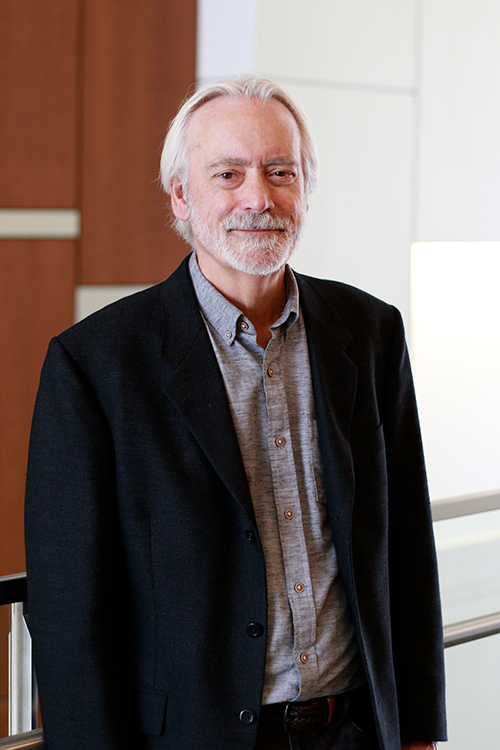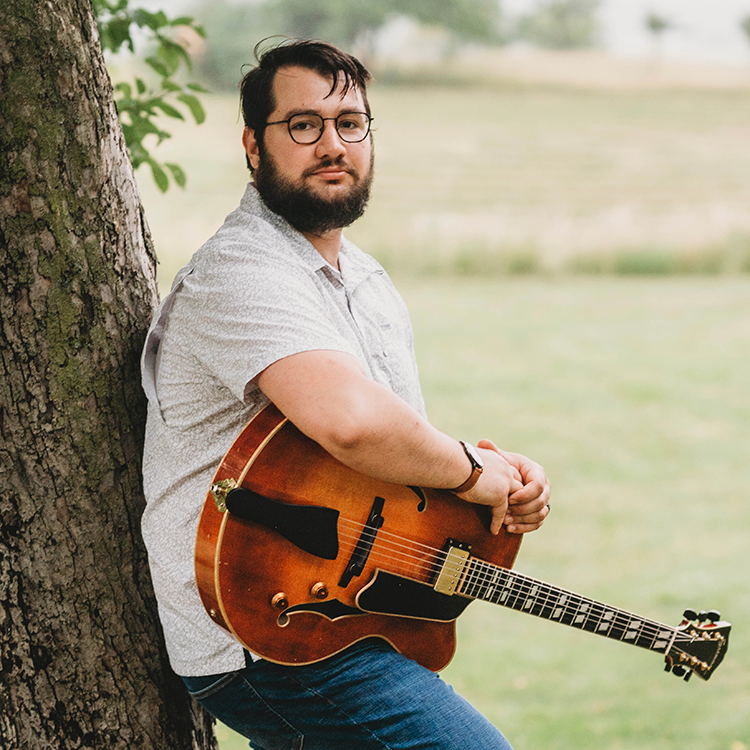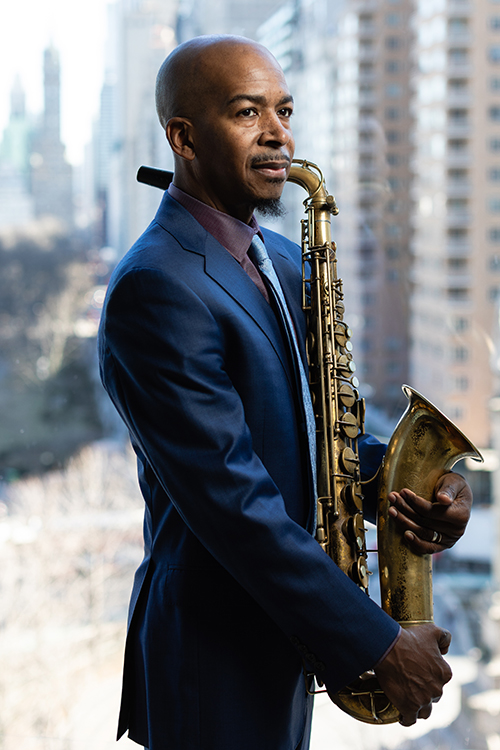The University of Tennessee’s Jazz Studies program has long been one of UT’s best-kept secrets. The degree program was founded in 1976 by Jazz Ed pioneer Jerry Coker, but the area’s tradition for great music extends back even further. Excellent faculty and students and a wide variety of performance opportunities make the Jazz Studies program one of the country’s most attractive programs for aspiring jazz and studio musicians.
The College of Music offers both Bachelor’s and Master’s degrees with a concentration in Studio Music and Jazz. At the undergraduate level, course work includes jazz theory and composition, history and analysis of jazz styles, jazz band arranging, and improvisation. All jazz majors participate in the jazz ensembles. The Jazz Big Band performs on campus and throughout the area and is an active part of the Jazz program at the University of Tennessee. Students performing in this group become familiar with the playing styles of many of the classic bands from the past and have a chance to work with compositions of today’s leading writers. Small jazz ensembles give students an outlet to experiment with material they are learning in their lessons and to receive immediate feedback from the different ensemble directors.


Meet Our Faculty

Keith Brown
Distinguished Lecturer of Percussion, Coordinator of Jazz
Keith Brown is a Distinguished Lecturer at the University of Tennessee where in addition to teaching applied drum set, he is the Director of Jazz Bands and coordinator of small Jazz Ensembles. He is an active performer playing regularly with several groups including Mark Boling’s Trio Life, and the Knoxville Jazz Orchestra where he has performed with (among others) Monty Alexander, Mulgrew Miller, Hank Jones, John Clayton, Maceo Parker, Wycliffe Gordon, James Moody, Jimmy Heath, Terrel Stafford, Stefon Harris, Karrin Allyson, Gregory Porter, Ingrid Jensen, John Pizzarelli, Ken Peplowski, Eric Reed, James Morrison, Warren Wolf, Cecile McLorin Salvant, and Christian McBride
He has also performed with Zim Ngqawana, Marvin Stamm, Doc Severinsen, Tommy Flanagan, Jerry Coker, Rick Simerly, Will Campbell, Greg Tardy, Donald Brown, Jeff Coffin and others.
He is featured on numerous CDs including several with the Knoxville Jazz Orchestra, and Boling, Brown, & Holloway. His recording with South African Saxophonist Zim Ngqawana Zimology In Concert (USA 2008) won a SAMA for best traditional jazz recording in 2008.
He is an active clinician giving both drum set workshop/clinics and with regional honor jazz bands.
He endorses Meinl cymbals and Innovative Percussion drumsticks. He is very involved with the Percussive Arts Society and has contributed articles to its official publication

Jon Hamar
Associate Professor of Jazz & Classical Double Bass | jhamar1@utk.edu
Jon Hamar is a versatile artist who has been recognized for his ability to find a tasteful unique voice in any musical situation. Jon recently moved from Seattle to Knoxville, Tennessee joining the University of Tennessee School of Music.
Jon has two degrees to show for his years of study. Jon earned a Bachelor of Arts degree in Classical Double Bass Performance from Eastern Washington University under the tutelage of Roma Vayspapir and Kelly Ferris. Jon graduated from the Eastman School of Music with a Master’s degree in Jazz and Contemporary Media, studying with Jeffrey Campbell, James Vandermark, Harold Danko, Clay Jenkins, Raymond Ricker, and Fred Sturm. Jon has performed with Ernestine Anderson, Benny Golson, Bob Mintzer, Steve Wilson, Benny Green, Regina Carter, Jeff Hamilton, Sachal Vasandani, Geoffrey Keezer, Terrell Stafford, and Pete Christlieb. Jon also performs regularly in an orchestral setting recording on movie soundtracks, and playing recitals and concerts.

Denin Slage-Koch
Coordinator of Music Business & Lecturer of Guitar | dkoch8@utk.edu
Having been praised as possessing “pristine playing, meticulous composing” and “a very personal voice deserving of attention,” award-winning guitarist, composer, and educator Denin Slage-Koch has done a lot. He’s played and recorded with artists like Ryan Keberle, Shane Endsley, Carmen Bradford, Clay Jenkins, Brad Goode, Wycliffe Gordon, and the Colorado Symphony, written music for artists like Melissa Aldana and Carmen Bradford, recorded three albums of original music and served as sideman for many more, published a book, and is a full-time member of the jazz faculty at the University of Tennessee Knoxville – and he’s not even 30 years old yet. Put simply, he is one of the most exciting and unique rising musicians on the scene today.

Greg Tardy
Associate Professor of Jazz Saxophone | gtardy@utk.edu
Associate Professor of Music in Jazz Saxophone Gregory Tardy is one of the most versatile jazz musicians of his generation, equally comfortable in a variety of musical and improvisational situations. Born into a musical family, he began his musical career studying classical clarinet with Russell Dagon and Jack Snavely. In his early 20s, while preparing for a symphony career he discovered jazz saxophone and hasn’t looked back.
In 1993, he started playing with the legendary drummer, Elvin Jones. As a sought after sideman he has played in the bands of many prominent jazz artists including: Andrew Hill, Tom Harrell, Dave Douglas, Wynton Marsalis, Jay McShann, Nicholas Payton, Roy Hargrove, Steve Coleman, Betty Carter, Don Byron, Bill Frisell, Rashied Ali, Ellis Marsalis, Brian Lynch, John Patitucci, and many more. He has also performed and/or recorded along with many other notable saxophonists, such as Joe Lovano, Mark Turner, Chris Potter, Dewey Redman, Ravi Coltrane, and others. In more recent years, Tardy has gone full circle, by focusing on his clarinets more, using them on recordings by Tom Harrell, Ohad Talmor/Steve Swallow, Stefan Harris, Chris Potter and Andrew Hill.
His performance schedule has taken him all over the world, playing at all of the major jazz festivals and on some of the biggest stages in jazz. As a sideman, he has been featured on several Downbeat Albums of the Year and also several Grammy nominated recordings; including a Grammy winning CD with Brian Lynch in 2006. Since 1992, he also has recorded fourteen CDs under his own name featuring his unique compositions, blending his love of traditional jazz with a more modern seeking style. His latest project, If Time Could Stand Still, was released in the fall of 2020 on WJ3 Records.

Vance Thompson
Senior Lecturer of Studio Music & Jazz | ithompso@utk.edu
Trumpeter, arranger and composer Vance Thompson is the director of the Knoxville Jazz Orchestra, a seventeen piece big band comprised of the top professional players in East Tennessee. Thompson founded the group in 1999 and established a non-profit organization to support it in 2000. It has since developed into one of the region’s most respected arts organizations.
The organization presents an annual six-concert big band series, a monthly small group concert series and an outdoor Summer series that runs weekly from May through August. It also sponsors an honors band for high school students and presents free, in-school concerts throughout the school year.
The Knoxville Jazz Orchestra has appeared at major jazz festivals in Europe, released five critically acclaimed CD recordings and sold-out dozens of events in venues ranging from 280 to over 1,500 seating capacity. Artists who have appeared with the band include pianists Hank Jones, Monty Alexander, Mulgrew Miller and Donald Brown; bassists John Clayton and Eddie Gomez; saxophonists James Moody, Maceo Parker, Vincent Herring and Greg Tardy; trumpeters Terrel Stafford, Marcus Printup, Sean Jones and Ingrid Jensen; trombonists Wycliffe Gordon and Conrad Herwig; clarinetist Ken Peplowski; vibraphonist Stefon Harris; and multi-instrumentalist James Morrison.
The orchestra’s CD recordings feature Thompson’s arrangements and have received heavy airplay across North America on Sirius satellite radio’s “Real Jazz” channel and other nationally syndicated broadcasts. These recordings have earned four star reviews in Downbeat Magazine and All Music Guide, topped the sales charts on popular internet music sites like Emusic.com and been spotlighted on NPR’s All Songs Considered.Thompson is originally from East Tennessee and is a graduate of the music programs at the University of Tennessee, Knoxville and DePaul University in Chicago. Thompson taught improvisation and small jazz ensembles at DePaul before moving back to Knoxville in 1999. In addition to teaching private trumpet lessons and coaching small jazz ensembles, Thompson teaches classes in jazz arranging, jazz history, jazz styles and music business.
Proficiency Exams
The jazz area scale/sight-reading juries are proficiency exams that must be passed before a jazz area faculty member will sign the form permitting a studio music and jazz major to schedule a recital. The exams are given during the regular end of the semester juries in the fall and spring semesters.
Scale Proficiency Exam
Studio Music and Jazz Majors are required to take the scale proficiency exam each semester they are enrolled in applied music until they have passed level 1 and 2 of the scale portions of the exam. Levels 1 and 2 of the scale proficiency exam must be passed before a student can give a junior recital.
- Level 1:Two octave modes/scales to be played ascending and descending in straight 8th notes with metronome at 120 bpm: Major, Dorian, Phrygian, Lydian, Mixolydian, Aeolian, Locrian, Chromatic.
- Level 2:Melodic Minor, Harmonic Minor, Diminished, Whole-tone, Blues, Augmented, Pentatonic. Full range major scale to be played ascending and desending in straight 8th notes with metronome at 120 bpm.
Grading of the scale proficiency is pass/fail. If a student is unsuccessful in playing a scale, a second attempt may be made. If a student fails to successfully play a scale after two attempts, the scale portion of the exam is failed.
Sight-Reading Proficiency Exam
Studio Music and Jazz Majors are required to take the sight-reading proficiency exam each semester they are enrolled in applied music, except during semesters when they are giving a recital. Levels 1 and 2 of the sight-reading jury must be passed to be eligible to perform a junior recital.
Applied teachers will bring sight-reading material written for their instrument. The reading example will be in line with real-life expectations. For example, guitarist and pianists will read chords symbols and rhythms as well as melodies, while saxophonists may read more chromatic linear material. Sight-reading examples must be played with a metronome or play-along track.
Grading of the sight-reading proficiency is pass/fail. If a student is unsuccessful in sight-reading the example, a second attempt may be made. If a student fails to successfully play an example after two attempts, the sight-reading portion of the exam is failed.
Recitals
Studio Music and Jazz majors are required to give a half-recital (Mus. Gen. 301) near the end of their junior year and a full recital (Mus. Gen. 401) near the end of their senior year. The jazz recital is intended for use by jazz majors only. Departmental policy states that the student must be enrolled for applied music lessons during the semester in which the recital is to be given. Juniors must have passed a 300 level jazz jury by the semester preceding the semester in which the junior recital is planned. The student must also pass the level two scale proficiency exam and the level three sight-reading proficiency exam to be eligible to perform a junior jazz recital. Seniors must have passed a 400 level jazz jury by the semester preceding the semester in which the senior recital is planned. The student must also pass the level four sight-reading proficiency exam to be eligible to perform a senior jazz recital. A recital should reflect all aspects of the student’s consummate development, such as improvisation, composing and arranging, ensemble playing, leadership, programming, instrumental ability, versatility (stylistic and perhaps instrumental), and the ability to select and organize assisting players.
The jazz recital should be approached chiefly as a solo recital, focusing on a single player rather than as an ensemble recital (this approach might be moderated somewhat in the case of bassists and drummers, since their function as members of the rhythm section carries considerable responsibility). Under no circumstances should the recital be approached in the manner of a loosely organized jam session. Brief solos by supporting players may be included, but they must not dilute the overall effect of a solo recital.
The assisting players will generally comprise a small group (rhythm section plus optional horns), but a variety in this respect, such as unaccompanied solos, duos, trios, or even large ensemble selections, is also welcome.
Original compositions and arrangements by the student giving the recital are most appropriate, though other well-selected tunes from established jazz artists/composers are also appropriate, especially if their inclusion would promote a well-rounded program, in terms of vehicle-types and tempos. The program may include some classical literature, if the student’s background and training seems to dictate that it would be appropriate.
The student is responsible for all mechanics of the recital. A check list is provided to aid the student in this respect. Items which are not shown in the list, but for which the student is nevertheless responsible include selection and organization of assisting personnel, scheduling and conducting rehearsals, staging, lighting, sound system, recording (optional), and seeing that all performers are in appropriate attire for the recital.

